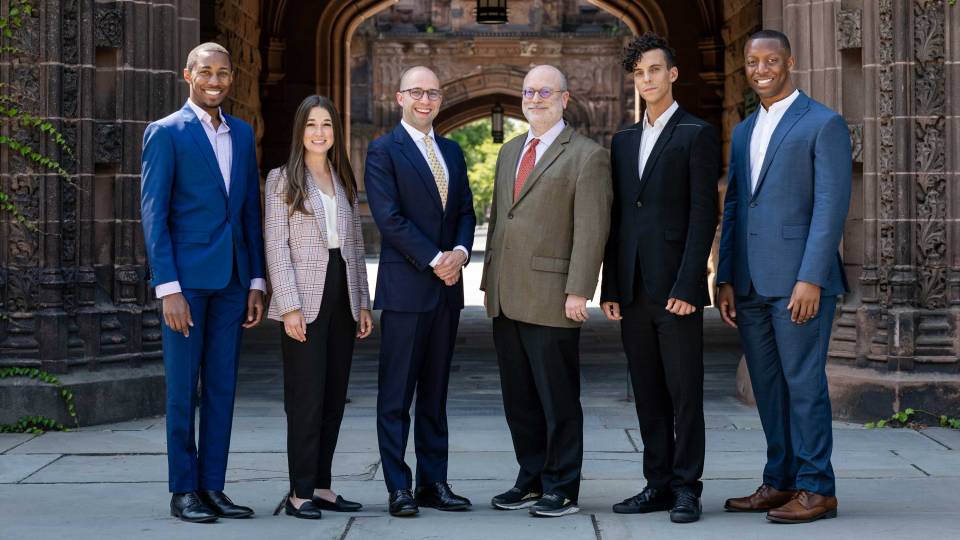Four new postdoctoral scholars have joined the Society of Fellows in the Liberal Arts(Link is external) this year.
The society, created in 2000 by a gift from Charter Trustee Lloyd Cotsen, is an interdisciplinary community that seeks to bring innovative approaches to scholarship and teaching at Princeton. It offers outstanding young scholars who have recently received their Ph.D. the opportunity to enhance their teaching and research over a period of three years.
The society is being led this year by Michael Wood, the Charles Barnwell Straut Class of 1923 Professor of English, who is serving as acting director while director Leonard Barkan is on leave. It includes Princeton faculty members who serve as faculty fellows and meet regularly with the Cotsen fellows in the Joseph Henry House for informal and formal discussion, seminars and lectures. Current faculty fellows include Esther da Costa Meyer, Benjamin Elman, Simon Gikandi, Eddie Glaude, Rena Lederman, Gideon Rosen and Paul Starr. The full complement of 12 postdoctoral fellows is drawn from a range of disciplines in the humanities, related social sciences and natural sciences.
The Cotsen Fellows for 2005-08 were selected from a pool of more than 900 applicants. They teach half-time in their academic department or program or in the Humanities Council(Link is external) and pursue their own research. They are:
• Margot Canaday (history), who received a Ph.D. in history
from the University of Minnesota and has been a postdoctoral fellow
with the Sexuality Research Fellowship Program of the Social Science
Research Council this past year. Her dissertation, titled “The Straight
State: Sexuality and American Citizenship, 1900-1969,” won prizes from
the Law and Society Association and the University of Minnesota. Her
research at Princeton will be devoted to revising her dissertation for
publication and beginning a new project on heterosexuality as a legal
regime in American history. This year she will join the faculty
teaching courses on “Gender in America” and “Approaches to Western
Culture, From the Renaissance to the Modern Period.”
• Christian Kaesser (classics), who holds a D.Phil. in classics from Oxford University. His doctoral research explored “The Meaning of Origins: Ancient Aetiology in Callimachus’ ‘Aetia,’ Propertius IV and Ovid’s ‘Fasti.’” He also is interested in the relation of art and text in late antiquity; his essays on the topic have appeared in journals such as Ramus and Greek, Roman and Byzantine Studies. In his new project, Kaesser will turn to the reception of antiquity in the collaborative works of Richard Strauss and Hugo von Hofmannsthal. At Princeton he is participating in the faculty team teaching “Approaches to Western Culture, From Antiquity to the Middle Ages” and will offer a course next semester on Roman literature.
• Jennifer Rubenstein (politics), who recently completed a Ph.D. dissertation in political science at the University of Chicago on “Just Samaritans? The Politics and Ethics of International Private Aid.” In her research she examines the ways in which humanitarian organizations provide moral justifications for their actions and decisions, grounding her work as a political philosopher in extensive primary research of organizational practices. In her new research project at Princeton, she will examine the role of imagination in political life. This year she is offering courses in the politics department on “Political Representation” and “Humanitarian NGOs and International Ethics.”
• Gayle Salamon (English), who received a Ph.D. in rhetoric
from the University of California-Berkeley, where she wrote her
dissertation on “Assuming a Body: Transgenderism and Rhetorics of
Materiality.” She has held a research fellowship at Brown University’s
Pembroke Center for Teaching and Research on Women, and has taught a
broad spectrum of courses at UC-Berkeley on the topics of embodiment
and gender. Her new research project at Princeton will explore
the role that proprioception and chronic pain can play in shaping a
bodily sense of self. Her teaching this year will include courses on
themes of “passing” in modern literature, and transgender theory.
Salamon holds the new LGBT Studies Fellowship, funded by an endowment
from the Fund for Reunion, the bisexual, transgendered, gay and lesbian
alumni association of Princeton.



